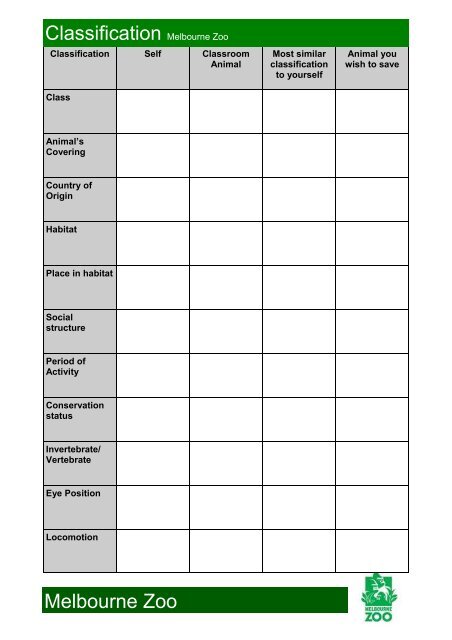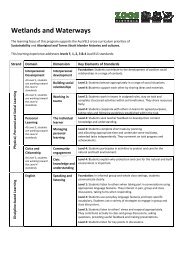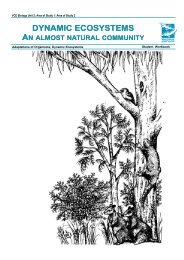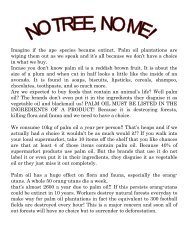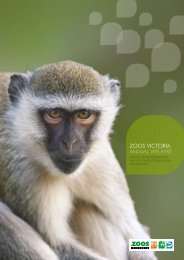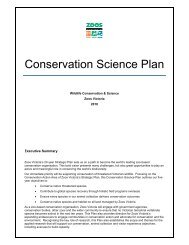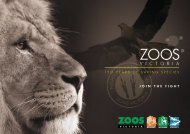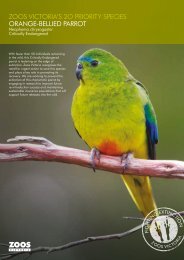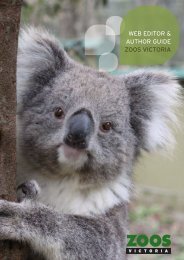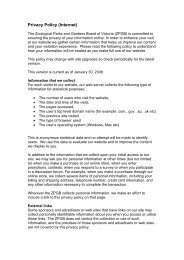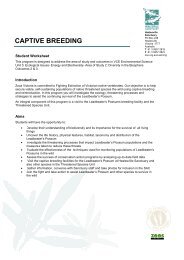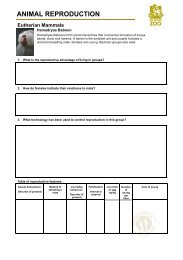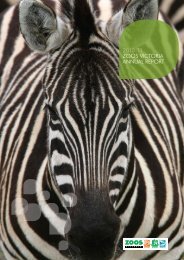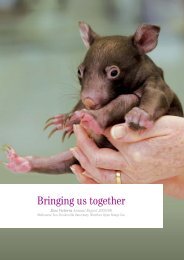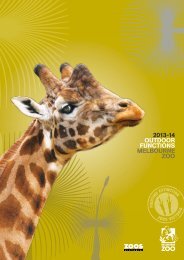Classification - Student Worksheet
Classification - Student Worksheet
Classification - Student Worksheet
Create successful ePaper yourself
Turn your PDF publications into a flip-book with our unique Google optimized e-Paper software.
<strong>Classification</strong> Melbourne Zoo<br />
<strong>Classification</strong> Self Classroom<br />
Animal<br />
Class<br />
Most similar<br />
classification<br />
to yourself<br />
Animal you<br />
wish to save<br />
Animal’s<br />
Covering<br />
Country of<br />
Origin<br />
Habitat<br />
Place in habitat<br />
Social<br />
structure<br />
Period of<br />
Activity<br />
Conservation<br />
status<br />
Invertebrate/<br />
Vertebrate<br />
Eye Position<br />
Locomotion<br />
Melbourne Zoo
CLASSIFICATION REFERENCE GUIDE<br />
Bioclimatic zone<br />
Arid:<br />
Bushland:<br />
Dry landscape featuring sparse vegetation; often rocky or sandy<br />
Open landscape featuring a range of medium to tall trees, shrubs and undergrowth<br />
Coastal:<br />
Characterised by ocean, rocks, sand, tidal pools and low-growing vegetation<br />
Mandrill canine<br />
teeth can<br />
measure up to<br />
5cm in length.<br />
Grassland:<br />
Montane:<br />
Open landscape dominated by grass species<br />
Mountainous; rocky and steep, vegetation is often stunted<br />
Rainforest<br />
Dense forest dominated by tall trees that form a canopy; receives over 2,000 mm of<br />
rain annually<br />
Wetland<br />
An area featuring one or more bodies of water and a range of aquatic<br />
and terrestrial plants<br />
The oldest Giant<br />
Tortoise on<br />
record lived to<br />
be 152 years<br />
of age.<br />
Place in habitat<br />
Terrestrial<br />
Arboreal<br />
Fossorial<br />
Aquatic<br />
Lives on the ground<br />
Lives in trees<br />
Lives underground<br />
Lives in water<br />
Class<br />
Bird<br />
Mammal<br />
Feathers, lays eggs, endothermic<br />
Fur, live young, endothermic<br />
Reptile<br />
Scales, lays eggs, ectothermic<br />
Amphibian<br />
Skin, lays eggs, lives in water and on land, ectothermic<br />
Diet<br />
Herbivore<br />
Carnivore<br />
Eats plants<br />
Eats meat<br />
Omnivore<br />
Eats both meat and plants<br />
Detritivore<br />
Eats the remains of matter that was once alive, such as fallen<br />
Tree kangaroos<br />
can leap to<br />
the ground<br />
from heights<br />
of up to 18m<br />
or even more,<br />
without injury.<br />
Body<br />
Temperature<br />
Ectothermic<br />
Endothermic<br />
leaves, dead skin and fecal matter (poo)<br />
Relies on external sources of heat to warm the body<br />
Can maintain body warmth using energy generated by metabolism<br />
(the chemical processes through which the body obtains energy<br />
from food)<br />
Social Structure Solitary Lives alone<br />
Communal<br />
Lives in a group<br />
Locomation Bipedal Moves on two limbs<br />
Quadrupedal<br />
Moves on four limbs<br />
Lateral undulation<br />
Wave-like movement patterns that act to propel an animal forward<br />
Although uncertain,<br />
Meerkats<br />
appear to be<br />
immune to<br />
scorpion and<br />
snake venom.<br />
Conservation Status<br />
Least concern<br />
Vulnerable<br />
Endangered<br />
Critically Endangered<br />
Does not qualify for a more at risk category. Widespread and abundant species are<br />
included in this category.<br />
Considered to be facing a high risk of extinction in the wild<br />
Considered to be facing a very high risk of extinction in the wild.<br />
Facing an extremely high risk of extinction in the wild in the near future.<br />
Extinct in the wild<br />
The species only survives in captivity; e.g. In Zoos.<br />
Extinct<br />
There is no reasonable doubt that the last individual has died<br />
Period of Activity<br />
Nocturnal<br />
Diurnal<br />
Mostly active at night<br />
Mostly active during the day<br />
Crepuscular<br />
Mostly active at dawn and dusk


